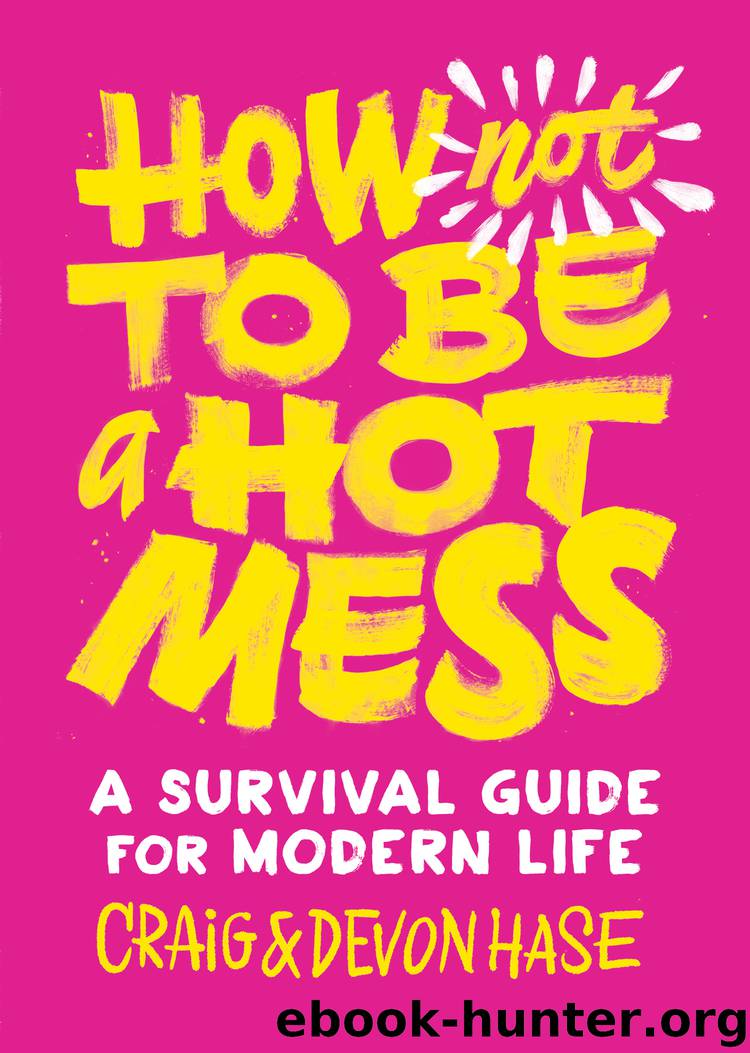How Not to Be a Hot Mess by Craig Hase & Devon Hase

Author:Craig Hase & Devon Hase [Hase, Craig & Hase, Devon]
Language: eng
Format: epub
Publisher: Shambhala
Published: 2020-04-21T00:00:00+00:00
When we lie, though, we need to continually rehearse to ourselves the lie we’ve told so we remember to tell it the same way again later.
Rehearsing to remember our lies takes up a lot of headspace. And it’s stressful.
All of this is no big deal if you’re just lying one time because some grad student in a white coat told you to. But if you’re lying in real life, your lies don’t stay in the lab. They follow you. You’ve got to keep things straight, and you’ve got to remember who you said what to, and you’ve got to make sure you don’t get caught.
Second, lying kills your reputation. Again, the research has a lot to tell us here. For example, one study conducted at Northwestern University’s Kellogg School of Management8 followed business students over the course of a semester as they learned to negotiate. During that time, the students in the class earned reputations as “liars,” “tough but fair,” or “cream puffs.” Then the researchers watched as the students entered into negotiations with one another in the final week of the semester. Far and away, the students who had earned reputations as liars fared the worst. Their fellow students treated them the most aggressively, were least polite to them, and offered them fewer concessions.
Third, lying is literally bad for your (mental and physical) health. A few years ago a group of researchers at Notre Dame conducted a study in which they split participants into two groups. Both groups came in once a week and—while hooked up to a lie detector—answered questions about how often they’d lied in the previous week. The difference between the groups? One group was given tips on how to avoid lying during the week. The other group wasn’t.
Both groups actually saw the numbers of lies they told drop throughout the study. But the first group—the one with the truth training—told a whole lot fewer lies. And the researchers found that the ones who lied less saw improvements in their physical and mental health. They also had less trouble sleeping, saw improvements in their relationships, had fewer headaches and less overall tension. They even reported fewer sore throats.
All this positive fallout comes down to what the Buddha called “the bliss of blamelessness.” Put simply, when you come to the end of your day, and you put your cell phone on airplane mode and put your head down on your pillow, if you can look back on everything you said, and everything you did, and see that you didn’t lie, cheat, steal, or kill, you’ll feel less bad.
This feeling good will make it easier to sleep. It will also make sex better (yes, really, and we’ll get to that in the next chapter), and it will be a heck of a lot easier to sit down and meditate, if that’s what you choose to do.
Okay, so just don’t lie. When somebody asks you a question, answer it straight. When you need something, ask for it straight.
Download
This site does not store any files on its server. We only index and link to content provided by other sites. Please contact the content providers to delete copyright contents if any and email us, we'll remove relevant links or contents immediately.
| Acupuncture & Acupressure | Aromatherapy |
| Ayurveda | Chelation |
| Chinese Medicine | Energy Healing |
| Healing | Herbal Remedies |
| Holistic | Homeopathy |
| Hypnotherapy | Massage |
| Meditation | Naturopathy |
| Reference |
Inner Engineering: A Yogi's Guide to Joy by Sadhguru(6783)
The Power of Now: A Guide to Spiritual Enlightenment by Eckhart Tolle(5742)
Fear by Osho(4724)
Ikigai by Héctor García & Francesc Miralles(4229)
The Art of Happiness by The Dalai Lama(4120)
The Ultimate Bodybuilding Cookbook by Kendall Lou Schmidt(3925)
Yoga Therapy by Mark Stephens(3740)
The Little Book of Hygge by Meik Wiking(3676)
The Healing Self by Deepak Chopra(3567)
Why Buddhism is True by Robert Wright(3441)
The Hatha Yoga Pradipika (Translated) by Svatmarama(3315)
Being Aware of Being Aware by Rupert Spira(3271)
Shift into Freedom by Loch Kelly(3192)
Wild Words from Wild Women by Stephens Autumn(3136)
Work Clean by Dan Charnas(3109)
Happiness by Matthieu Ricard(3037)
More Language of Letting Go: 366 New Daily Meditations by Melody Beattie(3017)
Yoga Body & Mind Handbook by Jasmine Tarkeshi(2861)
Why I Am Not a Feminist by Jessa Crispin(2737)
